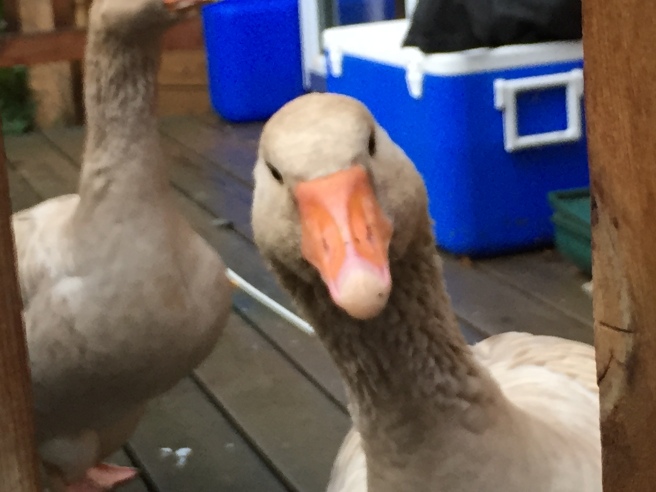Bullies or not? That is the question in my household right now, and the answer depends on who you ask. If you ask me, I would say of course not. The geese are all friendly, follow me around the yard, and like to try to beat me to the mailbox by flying down (they can’t go far, but they try). When I am carrying food and water to all the different poultry, the lead goose, Alfie, likes it when I take a break from chores and pet him while he chews on my jacket sleeve or tries to nibble my hair. My oldest son and daughter think the geese are only aggressive if they don’t know you, or suspect you of being mean to them. According to my youngest son, the geese are just mean. Of course, he did scare them, and they haven’t forgiven him for it. My husband and the geese used to get along. He herded them to bed when they were goslings, and would bring them lettuce to eat. Then it was time to butcher one, and they saw him carrying the carcass. Their beautiful friendship was at end.
Dave will arrive home from work, and they will come around the corner with a hard look in their eye, like James Dean in Rebel Without a Cause, their wings spread out, hissing, ready to charge the second he steps out of the car. Needless to say, his solution to this problem is to eat them all.
Is there a solution to this conundrum? I think so. I’ve been reading up on goose behavior and socialization in Dave Holderread’s book, “The Book of Geese: A Complete Guide to Raising the Home Flock.” Our first issue maybe that we have a small flock, or the geese could be a bit too tame. Birds in a small flock can become belligerent, and make pests of themselves (in other words become bullies). If they are overly tamed, the birds can lose whatever respect they had for people and try to dominate them.
The trick to rehabilitating gooseyard bullies is understanding their nature, and a whole lot of patience. If you have a goose who has decided to act aggressive toward to you, don’t strike at the bird or retreat. The first act encourages the goose to attack harder, and the second just proves he’s the boss, and you really are an intruder. Holderread says when a bird makes threatening advances the best thing to do is stand still, or to quietly go about your business. Don’t yell, wave your arms, run off, and most importantly don’t turn your back. Loud noises and sudden motions are interpreted by the goose as an attack. Turning your back is in indication of fear, encouraging our feathered friend to go for the flanks.
Stopping and standing still can be hard when a goose is coming at you hissing, neck outstretched, and wings fully spread. No one wants to get batted or nipped. However, this method takes away the stimulus of a fight. Aggressive birds usually lose interest and go on their way. Sometimes a goose may be cantankerous through and through, and refuse to give. If that’s the case, it’s time to decide who’s in charge, and what that means for the bird.
While the geese can be bullies sometimes, it’s not a chronic condition. Remember their nature, act calmly around them, and think about what may have caused the aggressive behavior.

We have geese here and I think you are right about them knowing you. They are good guards and honk as soon as they hear a noise but they are very placid with me – but then seeing me usually means some food! Others say they are mean too – maybe I waddle as I walk and they see me as one of their own.
LikeLiked by 1 person
I didn’t realize how particular they can be until we had a warm day a week or so ago, and my oldest son, who the geese like, went outside in a sweatshirt to visit with them. They charged at him, because they didn’t recognize him without his winter coat on. He went inside, put on his winter jacket, came back out, and they were buddies again.
LikeLiked by 1 person
Your oldest son and daughter are correct, at least based on my experience with geese. Food usually helps smooth things over.
LikeLiked by 1 person